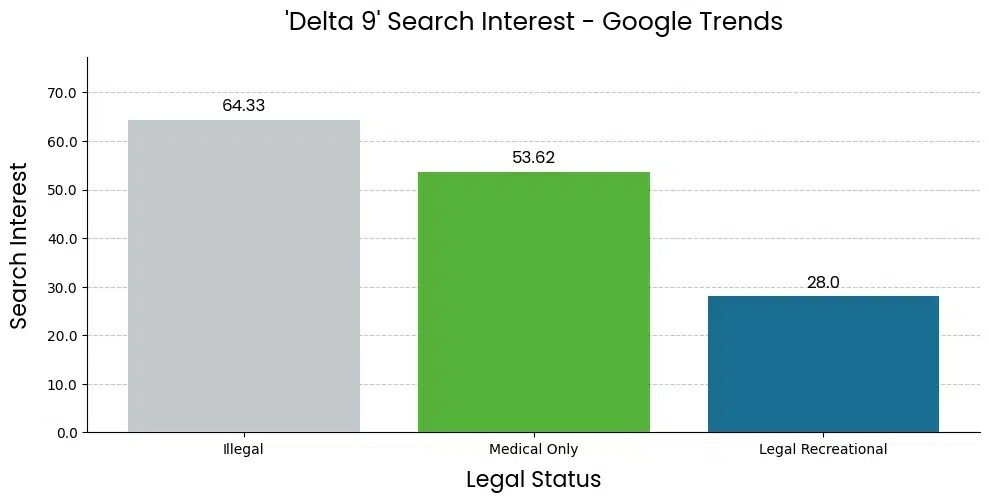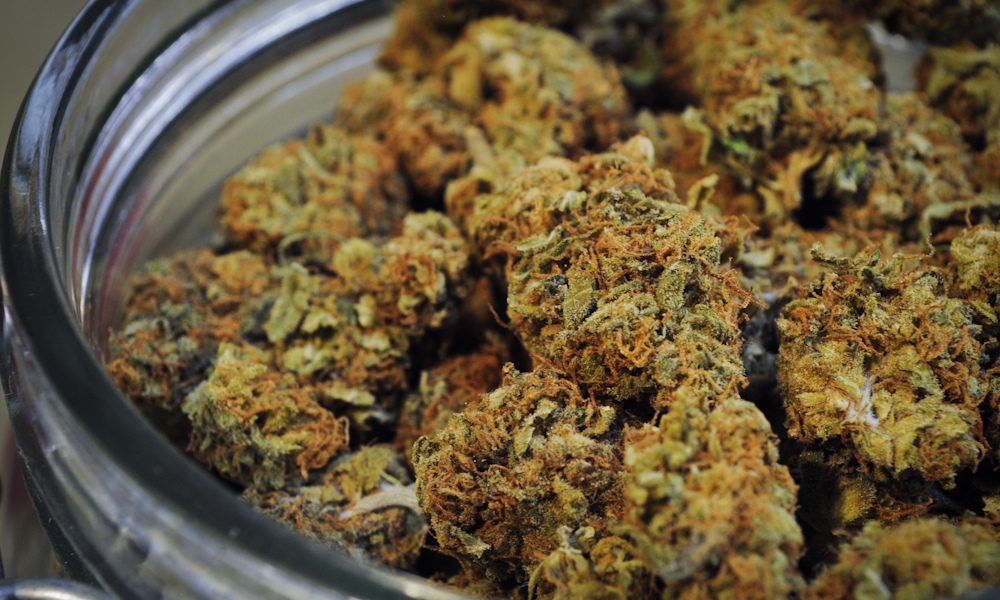A study says that internet search interest in delta-8 THC—a federally unregulated cannabinoid that is commonly synthesized or derived from hemp—is significantly higher in states where marijuana itself remains criminalized.
Looking at online search data available through Google Trends, CBD Nationwide—which calls itself the “largest” cannabidiol manufacturer in the U.S.—found that searches for delta-8 THC were 1.9 times higher in states where adult-use cannabis is illegal, “indicating a significant pivot toward alternative cannabinoids due to cannabis bans,” the company said.
“Cannabis prohibition clearly doesn’t work” the company’s CEO, Katie Devoe, said in a brief statement about the findings.
Delta-8 THC has been especially popular in states where marijuana remains illegal in part because it’s widely accessible online as well as at retailers like convenience stores, gas stations and smoke shops. The cannabinoid is typically obtained from hemp, which is federally legal, or produced synthetically from the crop’s other components.
The differing interest in delta-8 THC between states with different marijuana policies was statistically significant, the company said, with a p-value of “approximately 0.000000655,” meaning it’s extremely unlikely that the disparity in search data between legal and illegal cannabis states were due to random chance.
CBD Nationwide
“The heightened search interest in states where recreational cannabis is illegal suggests a pivot towards these alternative substances,” the study says. “This behavior may reflect a pursuit for legal avenues to achieve similar effects to those of traditional marijuana.”
Previous research “has shown a huge surge in interest in these substances,” said CBD Nationwide, “with an 850% increase in Google searches in 2021 alone.”
A federally funded study published by the American Medical Association (AMA) late last year found that states where marijuana is prohibited may “unintentionally promote” delta-8 products, a dynamic likely exacerbated by the increased availability of delta-8 THC and other cannabinoids following the federal legalization of hemp and its derivatives under the 2018 farm bill.
Meanwhile, results of the new CBD Nationwide survey show that interest in delta-9 THC—the primary psychoactive component of marijuana—is also higher in illegal states, although to a somewhat lesser degree.
States without legal cannabis showed 1.27 times more search activity for delta-9 THC compared to states where the cannabinoid is legal and regulated, the analysis found.
Search data showed that even in states where marijuana itself is legal, interest in delta-8 THC continued.

CBD Nationwide
“This trend is not just a reflection of a desire to circumvent the law,” CBD Nationwide’s report says. “Even in states with legalized recreational cannabis, there is a significant interest in Delta 8 THC, indicating a nuanced consumer market with varied preferences and needs.”
The analysis used analysis of variance (ANOVA) and Tukey’s Honestly Significant Different (HSD) tests to confirm the significance of the findings, the company said.
Importantly, the study did not attempt to determine the context of searches, meaning it’s not clear people in illegal states were necessarily seeking out products containing either cannabinoid or if they were researching current laws, scientific findings or something else.
There are mixed perspectives about how to address emerging cannabinoids among lawmakers, advocates and industry stakeholders. Some states have moved to ban or restrict their sale, for example. Others are pushing for revised federal rules to regulate intoxicating cannabinoids separately from CBD.
State marijuana regulators have urged Congress to ensure that they’re examining policies for the broader class of emerging cannabinoids—not just CBD.
The expectation is that congressional lawmakers will take up the issue during negotiations over the next Farm Bill—consideration of which has been delayed after the current legislation was temporarily extended.
The Drug Enforcement Administration (DEA) has said that it considers cannabinoids illegal if they’re synthetically produced—a common practice for delta-8 THC—but the market for such products has flourished nonetheless with limited enforcement.
The Food and Drug Administration (FDA), which has faced criticism for declining to enact CBD regulations, has only lightly addressed emerging cannabinoid issues. For example, the agency has sent warning letters to various companies that they say are unlawfully selling “copycat” delta-8 THC products that are misleadingly packaged to mimic popular brands like Doritos, Cheetos and Jolly Ranchers.
New Study Shows How Marijuana Compounds Like Cannabinoids, Terpenes And Flavonoids Interact For Medical Benefits
Read the full article here

